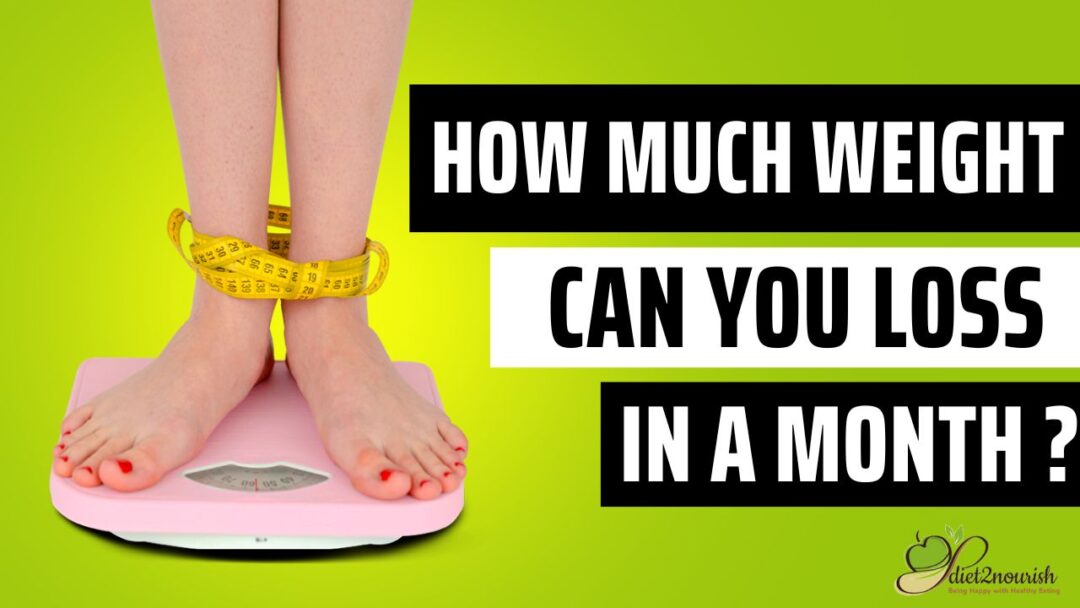How much weight can be lost in a month
We have grown accustomed to receiving results rapidly in our technologically advanced culture. Demanding rapid gratification is OK when discussing smartphones, but there are better courses of action when trying to lose weight. Before manifesting anything, you should know how much weight can be lost in a month.
Yes, losing weight is not a game. Losing weight requires motivation, patience, and time, which takes work. It is the reason why many people resort to fad diets to avoid hard work. However, there is no doubt that following a particular diet can reduce weight quickly. But first, you should know how safe it is. Knowing how much weight can be lost in a month is vital.
A person can anticipate losing weight with exercise and dietary adjustments. But many other things affect how much weight a person can lose. This article advises how much weight can be lost in a month.
How much weight is it right to lose in a month?
If you are still unaware of how much weight can be lost in a month. According to the Centers for Prevention and Disease Control, it is ideal for losing about 0.5 kg weekly, making it two kg monthly. Therefore, losing around 1.5 to 2.5 kg in a month is considered healthy.
What happens when you lose more than 2.5 kg in a month?
Many people are happy thinking they have lost a lot of weight fast in a month. But let us tell you how much weight can be lost in a month. If your weight decreases by 5 kg in a month, you will start feeling tired, weak, lethargic, and nauseous. If this is happening to you, you must revisit your diet. It is better that you consult an expert for help.
Keep in mind that about how much weight can be lost in a month, your energy level should be sufficient when you healthily lose weight. If you feel healthy from the inside, it means you are healthily losing weight, which is the perfect way to lose weight.
Choose an optimum plan to lose weight

You’ll need a strategy to lose weight and keep it off.
Instead knowing how much weight can be lost in a month
It’s a good idea to get assistance from a clinical dietician and nutritionist if you’re beginning your weight loss journey or have previously struggled to keep up with a plan. A dietician who can help you create a healthy eating plan that suits your requirements and long-term objectives can be recommended by your doctor.
A dietitian can help you develop healthy habits, manage your portion sizes, and steer clear of excess sugar, salt, and saturated fat, all of which are linked to conditions like diabetes and heart disease.
What is a healthy method to lose weight?
The process of losing weight can be both wonderfully easy and challenging at the same time. Now, you have an ideal answer for how much weight can be lost in a month, it is important to know about the healthiest method to lose weight.
A healthy diet and exercise plan to improve your health rather than just fitting into a new dress or looking good at an event will help you lose weight and keep it off. Following the given 12 ways can help you healthily lose weight.
12 ways to lose your weight in a healthy way
Never Miss Breakfast
Not eating breakfast will not aid in weight loss. You can be deficient in essential nutrients and nibble more frequently throughout the day because of hunger.
Consume routine meals
Eating regularly throughout the day promotes calorie burning. Additionally, it lessens the desire to munch on fatty and sugary foods.
Eat a lot of fruit and vegetables
Fruit and vegetables are high in fiber and low in calories and fat, and all three nutrients are necessary for effective weight loss. They are also loaded with vitamins and minerals.
Be more energetic
The secret to weight loss and weight maintenance is exercise. Exercise has various positive health effects and can aid in burning off extra calories that are difficult to shed through diet alone.
Find a habit you can fit into your schedule while enjoying staying energetic for longer.
Consume a lot of water
Sometimes people mistake hunger for thirst. When you need a glass of water, you risk consuming unnecessary calories.
Consume high-fiber meals
Foods high in fiber can help you feel satisfied, which is ideal for weight loss. Only foods made from plants contain fiber, including fruit and vegetables, oats, whole grain bread, brown rice, pasta, beans, peas, and lentils.
Examine food labeling
Choosing healthier selections is easier if you know how to read food labels. Use the calorie information to determine how a specific food fits your daily calorie allocation on the weight loss plan.
Use a smaller plate, please
You can consume smaller servings by using smaller dishes. You can gradually get used to eating smaller portions without feeling hungry by utilizing smaller plates and bowls. Eat slowly and stop eating before you feel full because it takes the stomach 20 minutes to communicate with the brain that it is complete.
Avoid banning food
Make sure to include all meals in your diet, especially ones you enjoy. Food bans will increase your desire for them. You shouldn’t occasionally indulge in a treat as long as you stay within your daily calorie limit.
A. Don’t have junk food on hand
Do not keep junk food, such as chocolate, cookies, chips, and sugary fizzy beverages, in your home to avoid temptation. Instead, choose healthful snacks like fruit, unsweetened or unsalted popcorn, uncooked oat cakes, unsalted rice cakes, and fruit juice.
B. Drink less alcohol
A typical wine glass can have the same calories as a chocolate bar. Drinking excessively over time can easily lead to weight gain.
C. Make a meal plan
Plan your breakfast, lunch, dinner, and snacks for the week while staying within your daily calorie limit. It could be beneficial to create a weekly shopping list.
Is it really good to try to lose weight fast?
Not at all. Quick weight loss can prove fatal for your health. It can also put you at risk of various health conditions. Therefore, the best way is to lose weight gradually.
How Harmful is Rapid Weight Loss?
According to experts, rapid weight loss is not suitable for health. This can put you at risk of a variety of health conditions. For how much weight can be lost in a month, experts say you don’t need to be fat, so you are unhealthy. However, one should try to maintain their ideal weight.
But if one cannot do so, it does not mean the person is unhealthy. Instead, losing weight gradually will reduce your weight permanently.
Rapidly reducing weight is a danger bell; know about these 9 serious diseases
Losing too much weight harms the kidney
If you lose weight rapidly, it means putting pressure on your bodily functions and internal organs, especially the kidneys, which is not good for your health.
Muscle loss
Loss of muscle mass can cause unexpected weight loss. Its main symptom is muscle weakness. One part of yours may also seem smaller than the other. Our body comprises fat and fat-free mass, including muscle, bone, and water.
Overactive Thyroid
For how much weight can be lost in a month, excessive weight loss can lead to bigger problems. Hyperthyroidism, or overactive thyroid, develops when your thyroid gland makes too much thyroid hormone. These hormones control many functions, including metabolism in the body. The result may be the phenomenon of unintentional weight gain.
Rheumatoid Arthritis
Rheumatoid arthritis (RA) is an autoimmune disease in which your immune system attacks the lining of your joints. This is a condition of the body in which constant pain in the joints and swelling occurs. Chronic inflammation can speed up metabolism and lead to overall weight loss. It usually affects both the joints of your body equally.
Diabetes
How much weight can be lost in a month? Another reason for unwanted weight loss is type 1 diabetes. If you have type 1 diabetes, your immune system attacks the insulin-producing cells in your pancreas. Without insulin, your body cannot use glucose for energy. This causes high blood sugar. Your kidneys remove unused glucose through urine. As sugar leaves your body, so do calories. Its treatment includes medicines, exercise, and reducing sweet things in food.
Depression
Weight loss can be a side effect of depression, defined as feeling sad, lost, or empty for at least two weeks. These feelings interfere with everyday activities, such as work or school. Depression affects the same parts of the brain that control appetite. Its symptoms differ from person to person. Major symptoms of depression include persistent sadness, loss of interest in favorite things, low energy, sleeping disorder, irritability.
Inflammatory Bowel Disease (IBD)
Excess weight loss can be a symptom of inflammatory bowel disease (IBD). Inflammatory Bowel Disease is one such disease related to digestion, which can give rise to many types of problems. Due to this disease, there can be a problem of long-term inflammation in the digestive system.
Tuberculosis (TB)
Another reason for excessive weight loss is tuberculosis (TB), an infectious condition that usually affects the lungs. Mycobacterium tuberculosis bacteria cause it. Weight loss and loss of appetite are the main symptoms of TB.
Cancer
Cancer is a general term for diseases caused by abnormal cells dividing and spreading rapidly. According to the American Cancer Society, the first symptom can be a weight loss of 10 pounds or more. Cancers of the pancreas, lungs, stomach, and esophagus are common.







